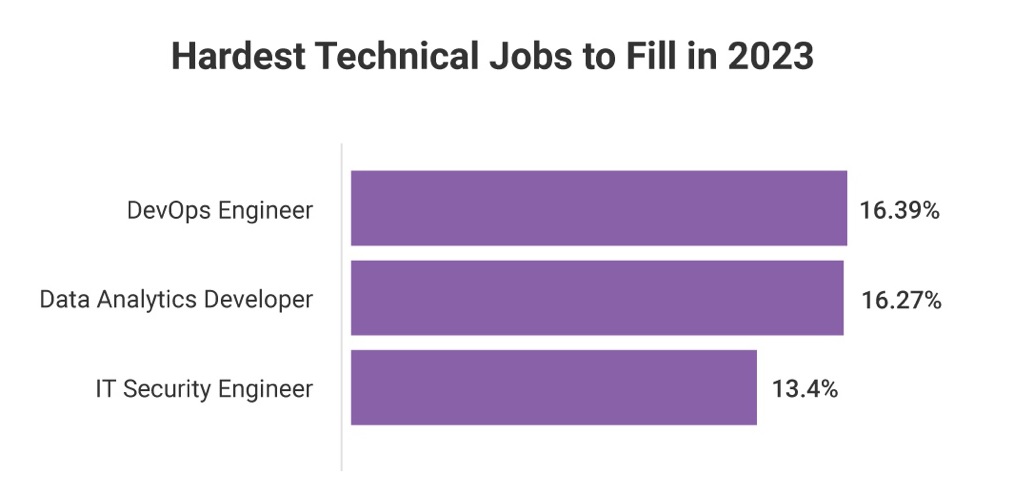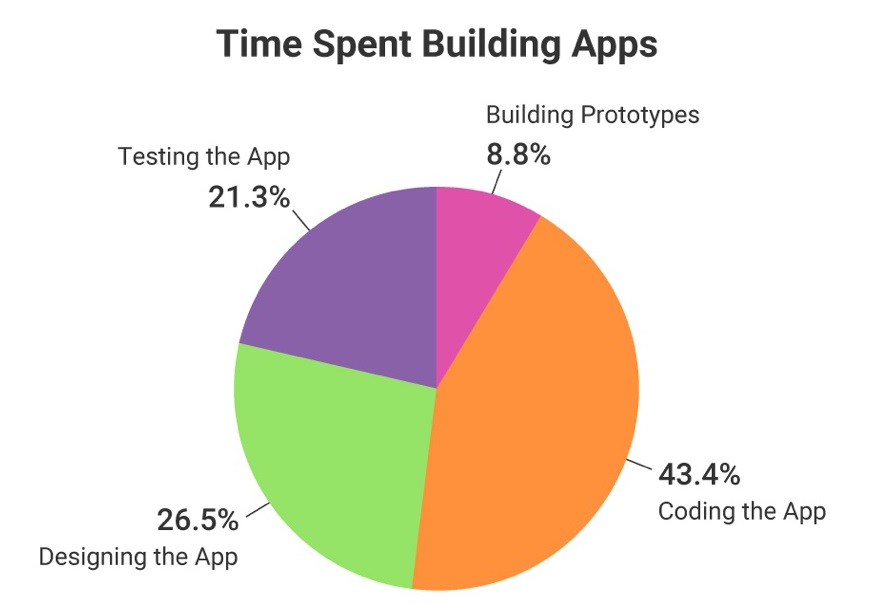LambdaTest announced the launch of the HyperExecute MCP Server, an enhancement to its AI-native test orchestration platform, HyperExecute.
Reveal's Software Development Challenges 2023 survey revealed that developer shortage remains a key challenge for the second year in a row.
According to one-third of the respondents (37.5%), the industry will continue to need help finding skilled developers in 2023.
The demand for tech talent just can't meet the supply of trained developers. The US Labor Department reports that software developers are among the top four most in-demand professions over the next 10 years. This demand has many implications for the software development industry, such as difficulty competing and innovating, higher costs, and lost revenue.
The survey also identified the top three technical jobs that will be hardest to fill in 2023. Engineers with DevOps skills (16.39%) are the most in demand, closely followed by Data Analytics Developers (16.27%), and IT Security Engineers (13.4%).

In today's tight job market, where demand for experienced employees outstrips supply, organizations must turn to new solutions that can address insufficient skills, solve problems and save money. The survey also found a growing need for innovations that can help meet the demand for building applications faster and with fewer resources.
The challenge of finding and recruiting the right tech talent is being solved by the use of low-code/no-code tools in three-quarters (76.8%) of organizations. Low-code/no-code tools are helping alleviate the demand for skilled developers by reducing the need for heavy hand-coding. This approach reduces the need for developers in areas such as UX flows, screen design, theming, and branding and can eliminate the need for manual HTML & CSS tweaking.

Key Software Development Challenges
The survey found that the most significant software development challenges in 2023 will be:
■ Inability to keep pace with innovation in developer tools (27.7%)
■ Difficulties with third-party integrations (26.7%)
■ Workload management (26.2%)
■ Security threats (26.1%)
■ Project management (26.1%)
■ Steep client expectations (26%)
Many of these challenges can be overcome with a digital workplace productivity tool.
Three years after the pandemic's start, the remote way of working has already become the new normal way of working. Digital workplace productivity tools are an integral part of this transformation as they provide distributed teams with the tools to complete their work efficiently. These platforms, which integrate project and content management, chat, and even data analytics in one software, increase work productivity, communication, and results.
To address these challenges, business teams are planning to better utilize their resources in 2023 by:
■ Improving project management (30%)
■ Improving designer/developer collaboration (30%)
■ Using software that will work for citizen developers (27%)
■ Utilizing remote staff (25%)
■ Incorporating data catalog/analytics catalog (25%)
The Need of Embedded Analytics
The benefits of embedded analytics are no longer a secret. Data rules the business world today, so businesses that delay incorporating analytics tools can lose their competitive edge.
The survey found that 48% of developers embedded analytics into clients' apps in 2022, compared to 30.8% in 2021, and 74.9% of software developers expect their organization's focus on business intelligence to increase in 2023.
Developers identified the top four reasons to embed analytics:
■ To improve productivity
■ To increase sales/revenue
■ To understand business problems
■ To make better business decisions
Expansion Plans
The plans for growth in 2023 include adopting new technologies and applications (such as low-code/no-code tools, embedded analytics solutions, and/or a digital workplace platform) into the software developer's workflow.
35% of respondents also plan to expand into new markets, and 32.5% are planning on taking on new projects. Requests for proposals are also expected to rise in 2023.
Methodology: Over 2,000 software developers and IT professionals participated in the Infragistics' Reveal survey from December 2022 to January 2023.
Industry News
Cloudflare announced Workers VPC and Workers VPC Private Link, new solutions that enable developers to build secure, global cross-cloud applications on Cloudflare Workers.
Nutrient announced a significant expansion of its cloud-based services, as well as a series of updates to its SDK products, aimed at enhancing the developer experience by allowing developers to build, scale, and innovate with less friction.
Check Point® Software Technologies Ltd.(link is external) announced that its Infinity Platform has been named the top-ranked AI-powered cyber security platform in the 2025 Miercom Assessment.
Orca Security announced the Orca Bitbucket App, a cloud-native seamless integration for scanning Bitbucket Repositories.
The Live API for Gemini models is now in Preview, enabling developers to start building and testing more robust, scalable applications with significantly higher rate limits.
Backslash Security(link is external) announced significant adoption of the Backslash App Graph, the industry’s first dynamic digital twin for application code.
SmartBear launched API Hub for Test, a new capability within the company’s API Hub, powered by Swagger.
Akamai Technologies introduced App & API Protector Hybrid.
Veracode has been granted a United States patent for its generative artificial intelligence security tool, Veracode Fix.
Zesty announced that its automated Kubernetes optimization platform, Kompass, now includes full pod scaling capabilities, with the addition of Vertical Pod Autoscaler (VPA) alongside the existing Horizontal Pod Autoscaler (HPA).
Check Point® Software Technologies Ltd.(link is external) has emerged as a leading player in Attack Surface Management (ASM) with its acquisition of Cyberint, as highlighted in the recent GigaOm Radar report.
GitHub announced the general availability of security campaigns with Copilot Autofix to help security and developer teams rapidly reduce security debt across their entire codebase.
DX and Spotify announced a partnership to help engineering organizations achieve higher returns on investment and business impact from their Spotify Portal for Backstage implementation.
Appfire announced its launch of the Appfire Cloud Advantage Alliance.




